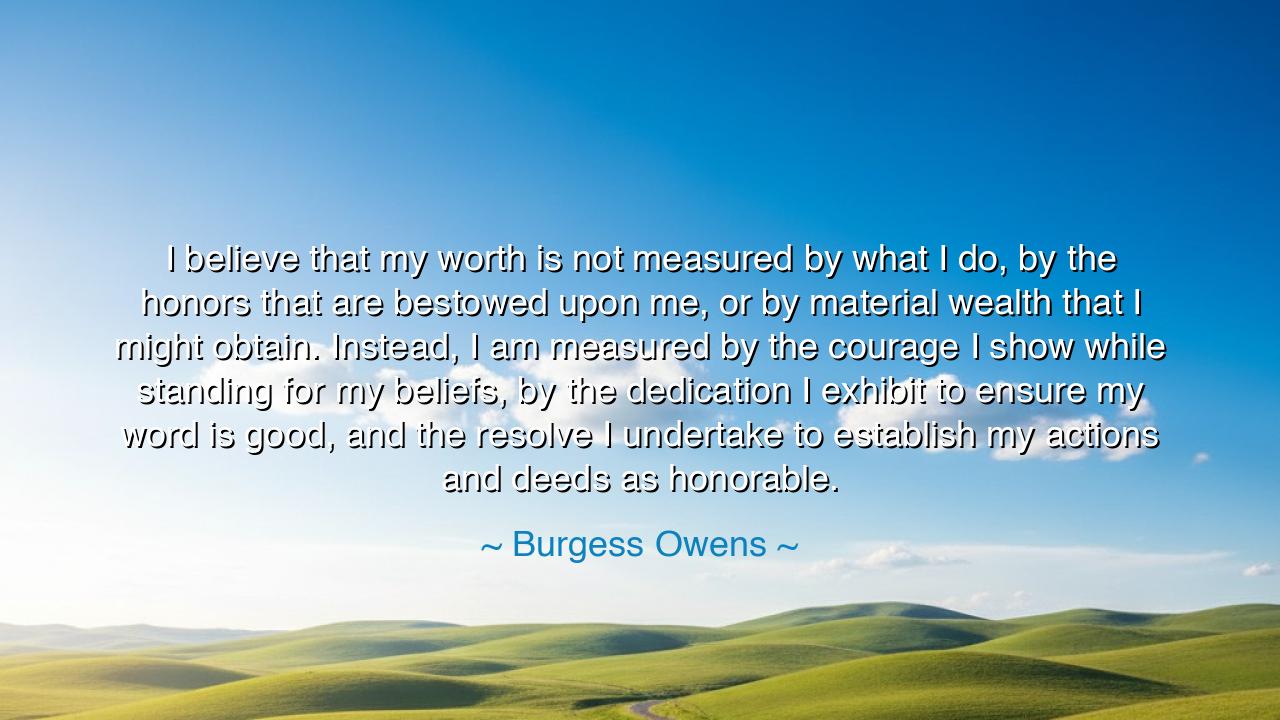
I believe that my worth is not measured by what I do, by the
I believe that my worth is not measured by what I do, by the honors that are bestowed upon me, or by material wealth that I might obtain. Instead, I am measured by the courage I show while standing for my beliefs, by the dedication I exhibit to ensure my word is good, and the resolve I undertake to establish my actions and deeds as honorable.






In his stirring declaration, Burgess Owens speaks not merely of himself, but of a universal truth that transcends time and station: “I believe that my worth is not measured by what I do, by the honors that are bestowed upon me, or by material wealth that I might obtain. Instead, I am measured by the courage I show while standing for my beliefs, by the dedication I exhibit to ensure my word is good, and the resolve I undertake to establish my actions and deeds as honorable.” These words resound with the ancient wisdom that true worth is not born from possessions or titles, but from character — from the integrity of one’s heart and the steadfastness of one’s spirit when tested by the fires of life.
The origin of this truth lies deep in the moral foundations of humanity. From the earliest days, wise men and prophets warned against the glittering illusions of power and wealth. The pharaoh’s treasures turned to dust; the emperor’s palaces crumbled into ruin. Yet, the legacy of the righteous endures — those who lived not for glory, but for goodness; not for applause, but for honor. Burgess Owens, a man who walked through both triumph and trial — from the shining fields of sport to the challenges of public life — learned through experience that the world’s crowns fade swiftly. What remains eternal is the courage to stand, the truth of one’s word, and the honor of one’s deeds.
To understand his wisdom, we may look to the life of Socrates, who stood unyielding before the judges of Athens. Offered the chance to save himself through silence or deceit, he refused. His worth, he believed, was not in his reputation as a philosopher, nor in the esteem of his fellow citizens, but in his devotion to truth. “I would rather die having spoken my convictions,” he said, “than live having betrayed them.” So he drank the hemlock with peace in his heart, and his courage made him immortal. Thus, Owens echoes that same sacred creed: that the measure of a man is not in how high he rises, but in how faithfully he stands when the world turns against him.
In our age, as in all ages, people chase titles, wealth, and recognition, believing these things to be proof of greatness. Yet, how hollow is such greatness when it is not rooted in virtue! A man may hold vast riches and command nations, yet be poor in soul if he betrays his word, if he abandons what is right for what is easy. The ancients knew this well: for them, honor was the truest wealth. To lose one’s fortune was misfortune, but to lose one’s honor was death of the spirit. Owens reminds us to return to that forgotten truth — that we must seek not to appear worthy, but to be worthy.
Consider, too, the example of Nelson Mandela, who endured long years of imprisonment, stripped of power and wealth, yet never surrendered his conviction. The world once called him a criminal; later it called him a hero. But the essence of his worth was neither title nor praise. It was the courage he showed in standing for justice, the dedication he maintained to truth, and the resolve he demonstrated to forgive when bitterness would have been easier. Like Mandela, the one who lives by principle, even in obscurity, leaves behind a legacy more enduring than gold — for gold tarnishes, but honor shines forever.
Owens’ words call us, then, to a nobler way of life — one where integrity outweighs success, and virtue becomes the standard of greatness. The true measure of a person is taken not in comfort, but in challenge; not in how they speak of values, but how they live them. Every promise kept, every injustice faced with courage, every small act done with sincerity — these are the silent bricks that build a life of meaning. The world may overlook such deeds, but heaven remembers them.
So, my child, if you seek to know your worth, do not look to your trophies or your possessions. Look instead to the truth in your heart, the strength of your convictions, and the honor of your actions. Ask yourself: “Do I keep my word? Do I stand firm in what is right, even when it costs me?” These are the questions that measure the soul. For when wealth fades and applause grows silent, only the light of your integrity will remain to guide those who come after you.
Remember always this teaching of Burgess Owens: your worth is not given by the world, but revealed by your courage. Stand boldly for your beliefs, speak truth with compassion, and let your deeds reflect the purity of your heart. In doing so, you will not only live honorably — you will live eternally, for the name of the righteous endures beyond the grave, while the names of the faithless are scattered like dust in the wind.






AAdministratorAdministrator
Welcome, honored guests. Please leave a comment, we will respond soon